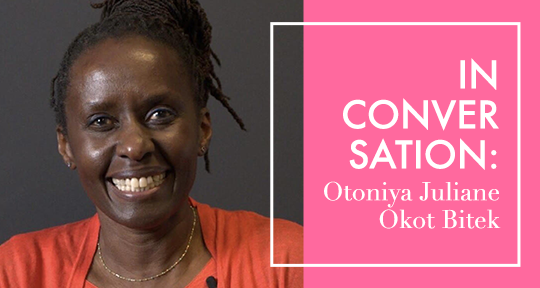“Dear Dad” is how Otoniya Juliane Okot Bitek opens a sequence of letter-vignettes to her late father, the revered northern Ugandan poet Okot p’Bitek, who wrote in Acholi and English. The intimate piece, entitled “The Meaning of a Song,” was included in River in an Ocean: Essays on Translation, an anthology of decolonial and feminist politics published by Tkaronto-based trace press. In it, Okot Bitek meditates on her Africanness as someone born to Ugandan exiles in Kenya after the Uganda-Tanzania War of 1978-79: “What is it to claim an African identity? What is it to be African or not? How is it that we’re not reading both Ocol and Lawino as African and imagining that there are far more representations of what it means to be African?” Such poignant examination is also to be found in her award-winning poetry collection 100 Days (University of Alberta Press, 2016), in which she muses on the terrains of history, wanting to know “what is it to come from a land / that swallows its own people”.
In this interview, I conversed with Okot Bitek on the expanse of Ugandan poetry of exile from Acholiland, African literature as world literature in itself (even and most specially) without translation, and the politico-literary legacy of her father, Okot p’Bitek.
Alton Melvar M Dapanas (AMMD): I want to start this conversation by quoting from your essay “The Meaning of a Song”, anthologized in River in an Ocean: Essays on Translation (2023):
We were people until we were Acholi, also Acoli, and then we were defined by foreign terminology by the Arabs and written in an even more foreign alphabet by the European colonialists and missionaries.
How is naming vital and significant in the collective sense, specially among the colonised?

